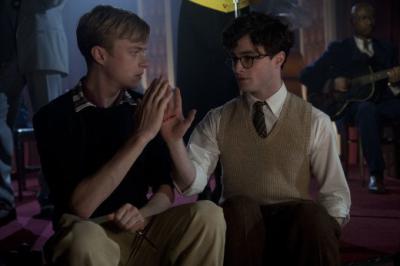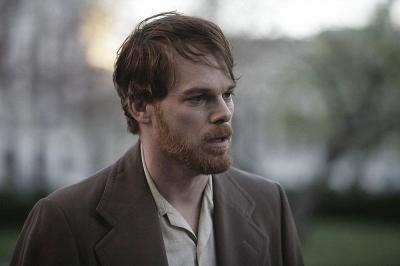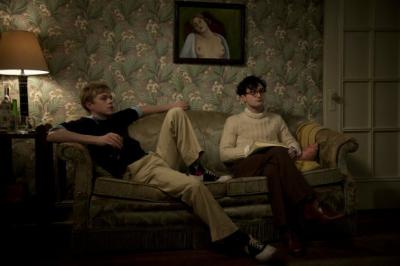By: debbie lynn elias
For over 50 years, America, and the world, have had some sort of obsession with the “Beat Generation”. Generation after generation has fallen under the spell of their words, their thoughts, their adventures. The faces and names of The Beats are, for the most part, well known – Jack Kerouac, Allen Ginsberg and William S. Burroughs. But it’s the lesser known men, Lucien Carr and David Kammerer, whose actions may have been the most responsible for how lives would unfold, careers would play out and perceptions and philosophies of the world would change.

KILL YOUR DARLINGS is the “untold” true story of the seeds that would make each man what he would one day become. The time is 1944. The boys are still boys, Benzedrine fueled and on the precipice of becoming men; for some, on the cusp of greatness; for others, self-imposed sequestration. Ginsberg, Burroughs and Carr are students at Columbia. Kerouac, a free spirit, is ready to ship out with Navy while Kammerer, well, Kammerer is in love with Carr, frustrated at being rebuked thanks to Carr’s fascination with and seduction of an adolescent Ginsberg. As personalities and literary and sexual lust collide, Carr kills lover/stalker David Kammerer, a killing which both pulled The Beats together while driving them apart.
A story that has remained relatively dormant all these decades, writer/director John Krokidas, together with co-writer Austin Bunn, now brings this chapter of history to life, something that the principal actors Daniel Radcliffe, Dane DeHaan and Michael C. Hall, as Ginsberg, Carr and Kammerer, respectively, were more than ready to tackle. However, the greatest challenge came from the fact that this is the first time any of them has played a real life person.
DeHaan, admittedly not knowing “that this story actually happened”, found the revelations about Carr “a surprise. He has this charisma and this extroverted quality to him that I think is different from work I’ve done in the past, but he’s still a really complicated individual. He seemed like a hard person to wrap my mind around.” Hall, on the other hand, “was aware of this story and went through my period of fascination with the Beats and was excited that it was being told, especially being told as well as it was in John and Austin’s script. I was excited more specifically about the opportunity to humanize and sympathize this guy who is a footnote in a lot of the accounts of the formative years of the Beat Generation, and was, if anything, characterized as a bit of a two-dimensional villain/stalker.”

Portraying one of the more famous and notable of The Beats, Alan Ginsberg, Daniel Radcliffe steeped himself in “Allen’s diaries from when he was a teenager.” By combining the words and emotion of the diaries “with the character I saw in the script, he was somebody I found to be very likeable immediately. He seemed by all accounts of people who’d talked about him, to have been very kind and warm and very good company. But also, the diaries reveal him to be this really interesting mix of somebody who had immense confidence and intellect and a very rich inner life. But, that doesn’t marry up with what he presented to the world at the time, because he was still quite reserved and shy as a young man. That’s a really interesting split in a personality. That difference between that inner confidence and outer shyness was very interesting to me. He was definitely an interesting character, regardless of what else he went on to do in terms of being a poet.”
Presenting its own hurdles and challenges beyond portraying real people, was portraying them in a different era. While all the actors have done period work of some sort, the combination of real events in an historical era added another layer to the experience.

For DeHaan, playing an individual from an historical context is not a “a terribly conscious effort, but I think they certainly spoke differently”, a focal point that required him to emulate “the way people would talk in the ‘40s.” Key to getting into the skin of the character also involved “having an awareness of what’s going on around you and the politics of the time . . . These were people that if they expressed how they truly felt about some things, they would be criminalized and they would go to jail. So that obviously has a deep impact on how you act with those around you. Just having that awareness, I think, affects what you’re doing.” Without missing a beat, Radcliffe echoes the sentiment, recalling a specific scene between himself and DeHaan which is “ the moment before Dane and I kiss in the park. You have to have an awareness that not only is this a big moment because he wants to kiss him for the first time, but also he does have to check around to see if anyone is there. So I think [historical context] does inform choices and stuff like that, but yet it’s not something you focus on too dogmatically.” Hall, the elder statesman of the group credits the script for being “so well-rendered” that “you could just give over to living in a world that is contextualized in a totally different way and everybody has different things that are useful, whether it’s listening to music or putting on the clothes or what have you.”
As opined by Hall, all three agree that in playing real people, “It’s fun to have some real things to hold onto. It makes it, to some degree, a different exercise to play a real person.” Expounding, Radcliffe notes that while “you do have a certain responsibility. . .[T]here’s a lot more material for you to hang onto and go, ‘He actually did that, this happened, and that is how he responded to that event.’ So you get a real insight into somebody’s character. . .[W]e were playing them as the people they were at this moment in their lives.”
KILL YOUR DARLINGS is in theatres now.












